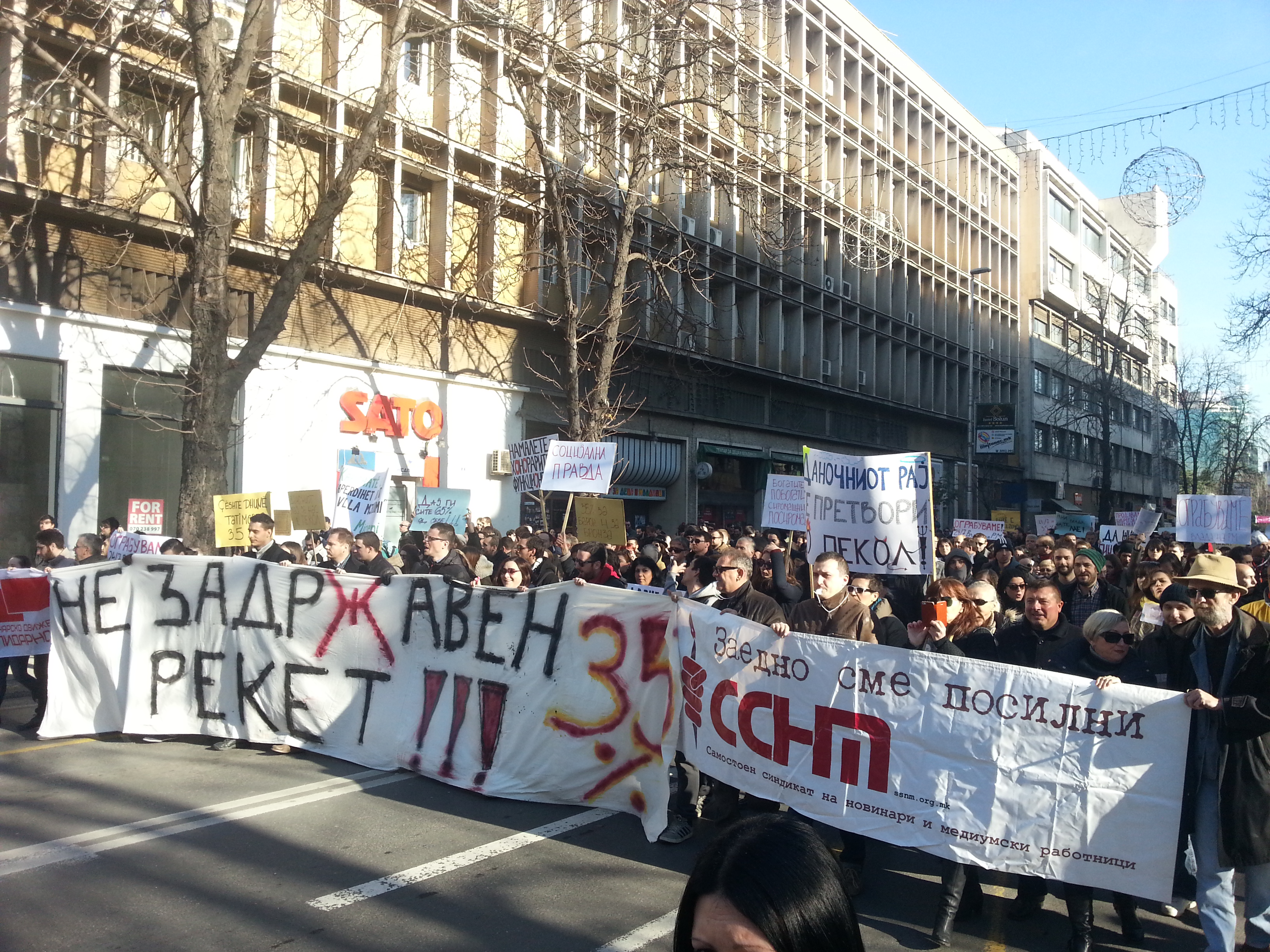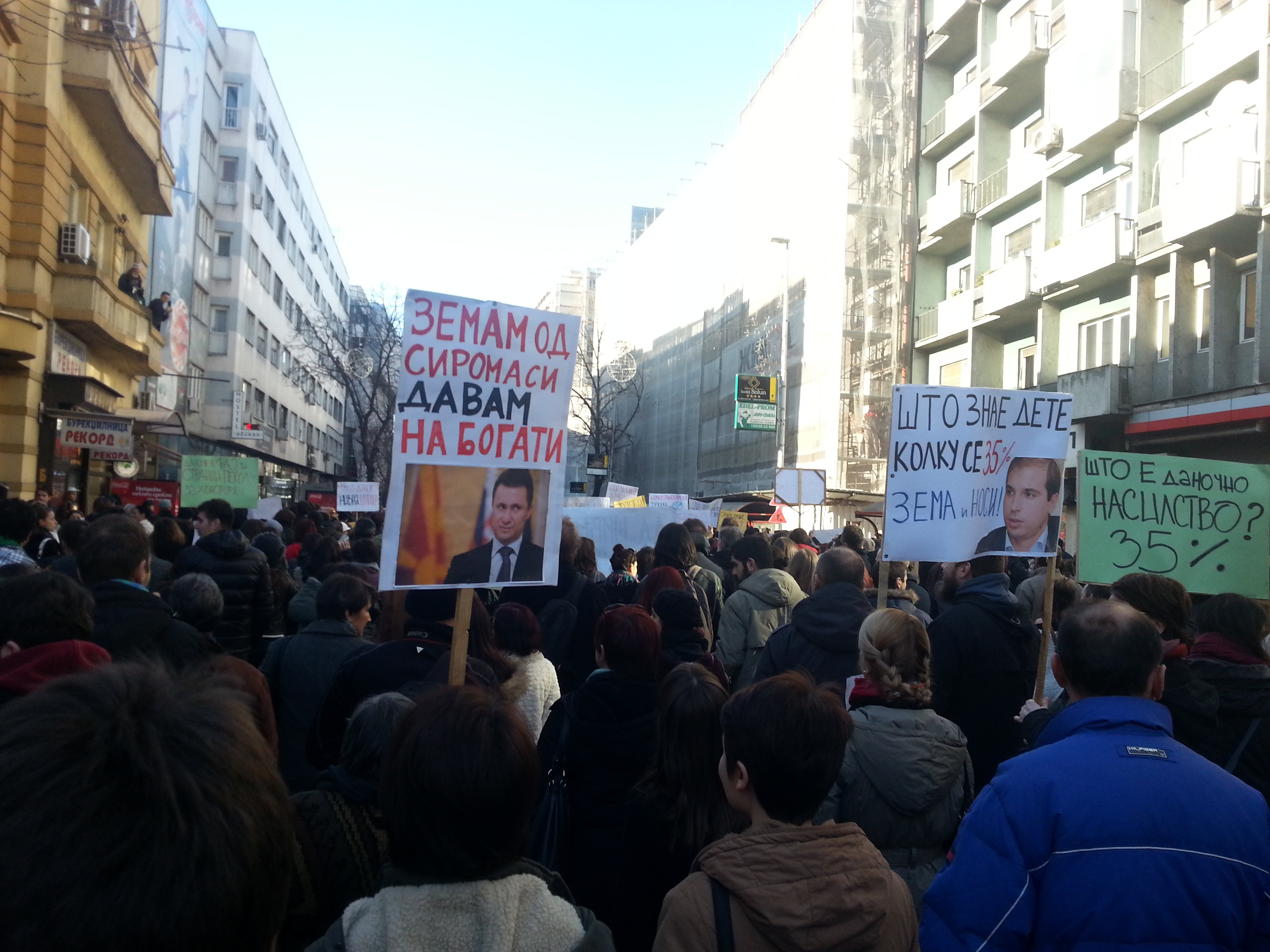
“No to racketeering by the state” – banner at a protest in Skopje, Macedonia, Dec 22, 2014. Photo: F. Stojanovski, CC BY.
Several thousand Macedonians took to the streets of downtown Skopje on December 22 to protest a new tax that requires mandatory contributions to the state retirement and health funds. The new tax will be imposed on earnings for freelance work and will be added to other personal income tax, effective January 1, 2015. In a country with an unemployment rate that nearly reached 29 percent in the second quarter of 2014, freelancing and working part-time is all that's available to many people.
The protest's organizers created Facebook event that attracted more than 5,000 RSVPs [1] and used the hashtag #ПротестХонорарци [2] (#ProtestFreelancers) on Twitter and Facebook. Ahead of the protest, over 15 diverse and otherwise unconnected organizations expressed their support, from the Macedonian Translators’ Association [3], to the independent Journalist Trade Union, to leftist organizations Lenka and Solidarity; and the Student Plenum [4]. Protest participants were joined by many prominent public figures, including artists, musicians, activists, and entrepreneurs, many of whom are freelancers themselves.
The protesters paid a visit to the Parliament, the Ministry of Labor and Social Policy, and the building of the Government of the Republic of Macedonia. There was no official response by the authorities.

“Taking from the poor to give to the rich!” – some protesters associated the Prime Minister Gruevski with the slogan of “reverse Robin Hood.” Skopje, Macedonia, Dec 22, 2014. Photo: F. Stojanovski, CC BY.
The tax's opponents claim it will directly affect workers, though income taxes and health insurance payments in Macedonia technically fall on employers. Critics say employers will respond to the new tax simply by lowering salaries, sometimes by as much as 35 percent. People also worry it will lead to discrimination, as several types of work, including elected and appointed public officials [5], would be exempt.
The tax is unpopular for several other reasons, too. Workers earning above minimum wage, for instance, are unable to register for unemployment benefits the following year. The extra tax burden is expected to weigh heavily on the nonprofit sector, as well as independent media outlets [6], where resources for additional spending are scarce. According to protesters, the new taxes will not increase the quality of state services in Macedonia, and will only shift the costs of the current system.
According to protesters’ main Facebook event page, paying additional taxes on freelance and part-time work is unacceptable for several reasons:
Намерата на Владата да воведе плаќање придонеси за хонорарите од 1 јануари 2015 година ќе доведе до зголемување на сиромаштијата и до зголемување на невработеноста. Покрај тоа, изземањето на државните службеници од оваа обврска што Владата им ја наметнува на сите други смртници, без никакво логично објаснение, ја покажува целата извитопереност на вака зацртаниот концепт на плаќање придонеси за хонорарите.
Кои се нашите барања?
Нашите барања се:
1) да се стопира примената на измените на законите со кои се воведува плаќање на придонеси од задолжително социјално осигурување за хонорарите, со цел да се отвори простор за нивна измена и повлекување;
2) преку засилени инспекции на Инспекторатот за труд да бидат отстранети случаите на прикриен работен однос, односно на наметнато вршење работа без договор или врз основа на договор за дело, при што за работниците не се плаќаат придонеси од задолжително социјално осигурување.
3) да се покачи или целосно да се укине највисоката месечна основица за пресметување и уплата на придонесите на плата од шест просечни плати.
Кого сè ќе го загрозат законските измени?
Голем број лица во Македонија, немајќи можност за редовно вработување, се принудени да се борат за својата егзистенција работејќи за хонорар, кој најчесто не е ниту редовен ниту висок. Покрај тоа, ним не им следуваат сите оние права кои ги имаат според закон работниците во редовен работен однос. Далеку од привилегирани, овие лица се дел од прекаријатот, еден од најзагрозените делови од работништвото. Ним, кога ќе стапат на сила законските измени, работодавачите ќе им ги намалат хонорарите за со тие пари да ги платат придонесите кон државата и на тој начин ќе предизвикаат нивно дополнително осиромашување. Дури е можно, неможејќи повеќе да ги плаќаат, да ги отпуштат од работа, со што ќе се зголеми и невработеноста.
Сите лица кои се работно ангажирани и сите лица што во иднина ќе бидат работно ангажирани се загрозени од овие законски измени![…]
Со овие законски измени Владата сака да превиди дека најголемиот проблем на Македонија е сиромаштијата, а не зголемувањето на парите кои таа ги контролира! И понуди лек кој е полош од болеста! Решавањето на проблемите кои самата власт ги создаде кај Фондот за пензиско и инвалидско осигурување и кај Фондот за здравствено осигурување не смее да биде на грбот на сиромашните и обесправените!
The Government’s intention to introduce contributions for freelance work from January 1, 2015, will lead to increased poverty and unemployment. Besides, exempting state employees from this obligation which the Government imposes on the all other mortals, without any logical explanation, shows the full perversity of the concept.
Our demands are:
1. Stop the implementation of the new regulations… in order to create space for their change and withdrawal.
2. Increase the work of the Labor Inspectorate and detect the actual cases of hidden employment, or the proclaimed issue of working without contracts or not paying of social security contributions…
3. Increase or abolish the highest monthly base for calculating contributions which currently amounts six average salaries.Who will be affected by these legislative changes?
Large number of Macedonian citizens who have no opportunity for full-time employment are forced to fight for their existence working for honorariums, which most often are neither regular or large. Such freelancers are not entitled to labor rights which come with full-time registered employment. Far from privileged, they are part of the precariat [8], the most endangered working class. When these legislative changes come into effect, their employers will lower the honorariums in order to pay the contribution benefits requested by the state, thus causing further impoverishment. It is also possible that, with a lower bottom line, that many such people would be fired, increasing the unemployment.
All persons who are employed full-time and all people that will be employed in the future are affected by these legislative changes! […]
With these amendments the government wants to overlook the biggest problem of Macedonia — and that is poverty — not the increase in the amount of money it controls! The remedy offered is worse than the disease itself! The poor and the oppressed should not be used as scapegoats and sacrificed so the government can overcome the problems with the Pension and Disability Insurance and the Health Insurance Funds it itself created!
Macedonia's parliament adopted the new legislation in a special meeting last summer, bypassing typical requirements for public discussion and consultations with stakeholders. Politicians waited until October to address several ambiguities in the new regulations, and the government has refused [9] to postpone implementation. Recently, however, there are some signs lawmakers might be willing to roll back certain privileges [10] for public officials that were built into the law. (Officials inexplicably removed [11] from the state pension fund's website language that would have enforced these entitlements.)
Some social media users accuse the state of adding unconstitutional and discriminatory clauses to the new regulations, just to serve as a bargaining chip the state can later withdraw, as a way of pacifying the public.

“Hell comes when you could have said ‘No!,’ but you kept silent” – protest in front of the Government of Republic of Macedonia, Dec 22, 2014. Photo: F. Stojanovski, CC BY.
So far, the Macedonian government has not wavered before demonstrators, even after massive student protests [12]. The expected influx of money from this new kind of levies (some 68 million euros [13]) will to some degree help fund the country's depleted healthcare and pension spending [14]. Macedonia has about 2 million citizens, and its state budget is burdened with the salaries of 180,000 state employees, as well as various benefits for key segments of the population that vote mainly for the ruling Parties, such as retired persons and farmers who receive state subsidies.
#ПротестХонорарци [15] pic.twitter.com/EpTun6yALl [16]
— Венчо (@veky9) December 19, 2014 [17]